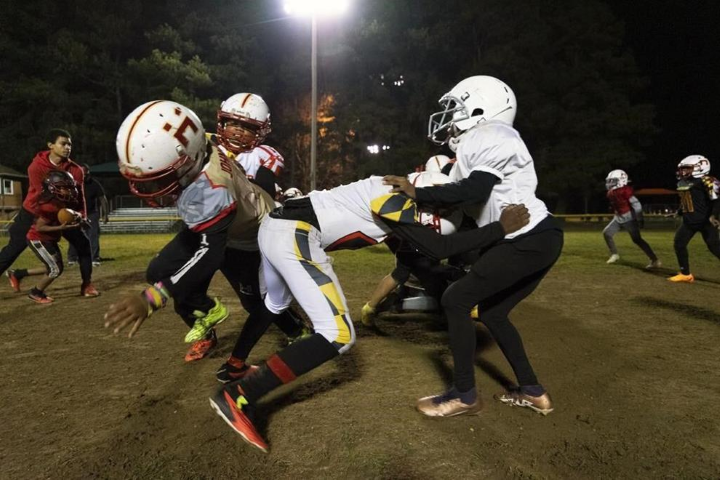
File Photo(Univ. of Maryland/Freddy Wolfe via AP)
Youth tackle football offers children starting as young as 5 not just a chance to build friendships and learn teamwork, but also the potential path to college scholarships and maybe even a career in the NFL. However, alongside these opportunities, mounting research highlights the risks of injuries that can harm developing brains.
Over the years, participation in youth tackle football has dwindled, reflecting growing concerns among families about the sport's safety. Yet, notably in communities of color, the appeal of tackle football remains potent, often outweighing the perceived risks in favor of the potential rewards.
According to a nationwide Ipsos poll commissioned by The Shirley Povich Center for Sports Journalism and the Howard Center for Investigative Journalism at the University of Maryland:
- Black parents, by significant margins, are more likely than white parents to believe that youth tackle football could lead to a college scholarship or a professional football career. Similarly, Hispanic parents also view college scholarships and pro careers as potential benefits of youth football more often than white parents.
- A noteworthy percentage of Black parents consider 9 years old or younger an appropriate age for children to start playing tackle football, compared to only a fraction of white parents who share this view.
Terrence Byrd, president of Maryland Heat, a youth tackle football program primarily serving Black boys as young as 5, acknowledges the risk of injuries but believes that the opportunities the sport offers outweigh these concerns. However, medical studies have linked head trauma in football to chronic traumatic encephalopathy (CTE), raising alarms about the impact on young, developing brains.
While some researchers argue that head impacts in youth football may not consistently lead to cognitive, emotional, or behavioral changes, others emphasize the potential long-term risks, especially for children with years of exposure to the sport. Dr. Robert Cantu from the BU CTE Center underscores the vulnerability of children's brains to impacts, given their disproportionate size and underdeveloped neck muscles.
Despite the growing debate, youth tackle football leagues remain popular, particularly in areas where the sport enjoys strong community support. Some parents believe that early exposure to tackle football enhances their children's chances of securing college scholarships and a better education. Schools like DeMatha Catholic High School actively recruit players from programs like Maryland Heat, with many athletes securing college football scholarships.
However, concerns about injuries persist, with some parents advocating for delaying tackle football until high school or exploring non-contact alternatives like flag football. Former NFL players like Solomon Brannan emphasize the importance of education alongside athletic pursuits, cautioning against over-reliance on sports for future success.
At the University of Maryland, football coach Michael Locksley acknowledges the risks but sees football as a metaphor for life, teaching resilience and determination. While his wife believes children shouldn't play tackle football before 14, Locksley remains supportive of the game, seeing it as a valuable learning experience.
As families navigate the complex decision of whether to enroll their children in tackle football, the debate continues over how to balance the sport's potential benefits with its inherent risks, highlighting broader societal questions about youth sports, education, and opportunity.















